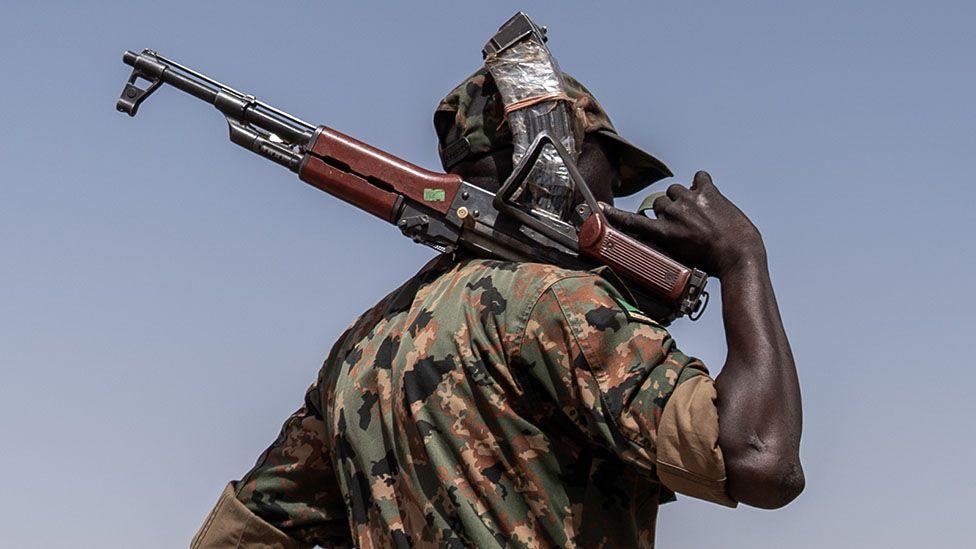Sudan’s oil-rich Kordofan region has become a critical flashpoint in the ongoing conflict between the country’s military and the Rapid Support Forces (RSF), as both factions vie for strategic dominance in a war now dragging into its third year.
The spotlight has turned to Kordofan following airstrikes earlier this month that claimed hundreds of civilian lives, intensifying focus on this expansive central-western region.
“Kordofan is not just a battlefield it’s the key to Sudan’s oil lifeline and a vast territorial stronghold,” said Amir Amin, an analyst at Oasis Policy Advisory, speaking to the BBC. “Whoever secures it essentially gains control over Sudan’s energy infrastructure and a significant portion of the country.”
The region is equally important to neighboring South Sudan, whose oil exports rely on pipelines running through Kordofan. As such, the area's stability directly affects its economic interests.
Comprising three states and home to nearly eight million people, Kordofan has seen fierce clashes escalate since June. That’s when the Sudanese Armed Forces (SAF) launched a campaign to reclaim territory after the RSF had gained ground in previous months, including in the capital Khartoum and the fertile Gezira region.
Sudanese military chief Gen Abdel Fattah al-Burhan made a symbolic visit to Khartoum International Airport on June 20, marking his second trip to the city since troops recaptured it in March. However, he continues to operate from Port Sudan, suggesting a lack of full control over the war-ravaged capital.
Since the war broke out in April 2023 sparked by a bitter fallout between Gen Burhan and RSF commander Gen Mohamed Hamdan Dagalo, widely known as “Hemedti” the conflict has led to over 150,000 deaths and displaced around 12 million people, roughly the population of Belgium.
The RSF, once allied with the army and instrumental in the 2021 coup that cemented Burhan’s power, turned against the military after resisting efforts to merge with it, triggering the current war.
With the RSF’s roots in Darfur, the army now seeks to crush its presence in Kordofan before pushing westward. “The army sees Kordofan as the staging ground for a larger offensive into Darfur,” explained Alan Boswell of the International Crisis Group. “Meanwhile, the RSF wants to cement control here to regain momentum and potentially threaten Khartoum again.”
Yet, the SAF may face stiff resistance. Dr Suliman Baldo, head of the Sudan Transparency and Policy Tracker, warned that the RSF draws significant local support in West Kordofan, particularly from the Misseriya ethnic group. “These fighters are defending their own communities, making them more determined and deeply embedded,” he said.
Recent airstrikes by the army on towns such as el-Fula and Abu Zabad have further inflamed local resentment. Dr Baldo described the attacks as a “misguided tactic of punishing entire communities perceived to support the RSF.”
Although the military maintains control over oil fields in the region, the RSF has threatened to expand operations into South Kordofan’s Heglig oil zone close to the South Sudan border if bombardments continue.
“If the army’s air raids resume, we will shut down Heglig and kill the engineers,” RSF official Youssef Awadallah Aliyan reportedly told the Sudan Tribune after visiting the bombed el-Fula market.
The United Nations Office for the Coordination of Humanitarian Affairs (OCHA) condemned the attacks, stating that over 20 civilians, including families sheltering in a school, were killed in the strikes. The agency reiterated that civilian infrastructure should never be targeted and reminded all parties of their obligations under international humanitarian law.
The RSF itself is also under fire for alleged atrocities. UNICEF reported that over 450 civilians including children and pregnant women were killed in recent RSF attacks in North Kordofan’s Bara area and surrounding villages.
“These are horrifying incidents,” the agency said, calling them “a terrifying escalation of violence and blatant disregard for human life.”
Satellite imagery analyzed by the Yale Humanitarian Research Lab pointed to deliberate arson in Shag Alnom, one of the affected villages. The Emergency Lawyers group said many victims were either burned alive in their homes or shot on sight.
Now, concerns are growing over a potential RSF offensive targeting el-Obeid, North Kordofan’s capital. Control of nearby Umm Sumaima currently shifting between both sides is seen as pivotal.
“It’s the final barrier before el-Obeid,” said Dr Baldo.
According to Mr. Amin, capturing Umm Sumaima could allow the RSF to surround army positions in the city, while the military aims to reopen supply lines to reinforce its troops across Kordofan.
With both sides heavily invested and the stakes soaring, analysts expect the struggle over Kordofan spanning some 390,000 square kilometers to be long and grueling.
“Whether this battle decides the war’s outcome is uncertain,” said Amin. “But it will certainly reshape the entire conflict.”

